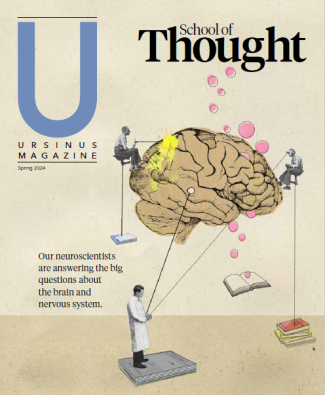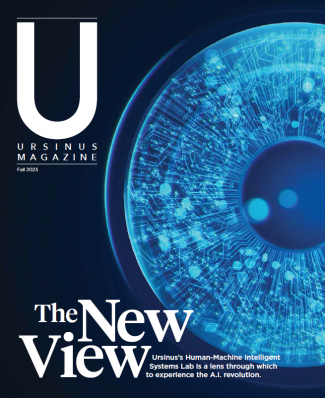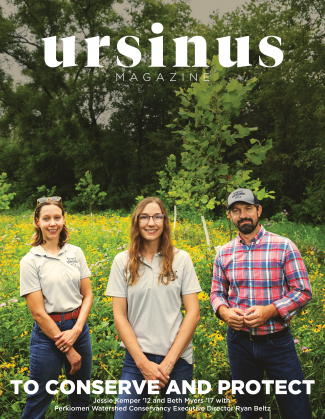Summer Fellows: A 30-Year Showcase of Exploration and Dedication
The Summer Fellows program as we know it today has roots dating back 30 years, when a Howard Hughes Medical Institute (HHMI) grant supported the work of 10 student-faculty research pairs in the sciences in the summer of 1992. Four years later, the college expanded the program to include students from every discipline, and then it was cemented as a permanent offering in 1999.
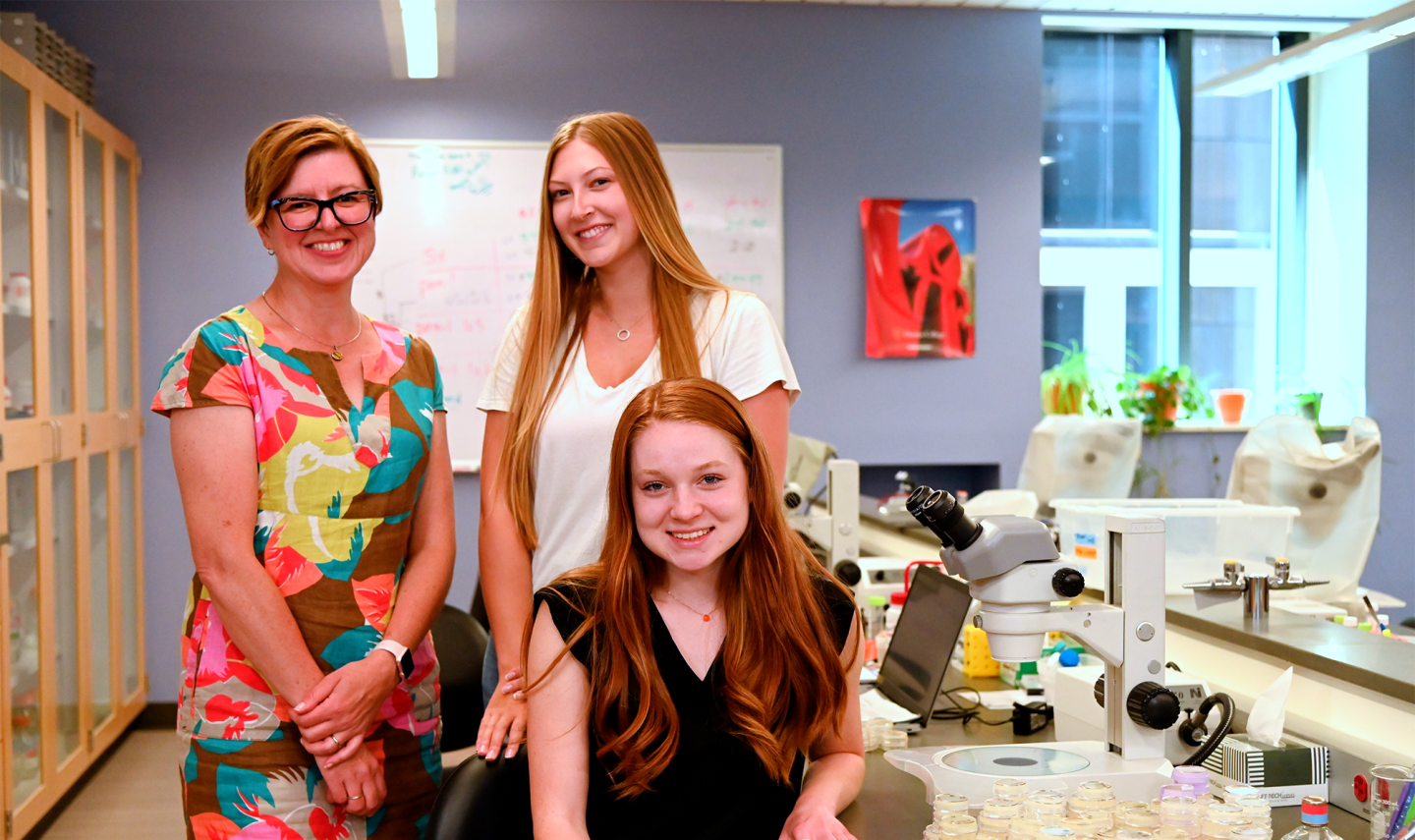
It was the 1996 expansion to include all disciplines that makes Ursinus’s Summer Fellows program distinctive. “Many schools like Ursinus have some sort of science lab experience available to students in the summer—and of course we have that too—but students who are in the humanities, arts, and social sciences can also participate here,” said Associate Dean of Academic Affairs and Professor of Philosophy and Religious Studies Kelly Sorensen, who has been running the program since 2016 as part of his role on the Student Achievement in Research and Creativity Committee.
“At other schools, a student can do a biology project, but they can’t do Shakespeare, dance choreography, or art. We really punch above our weight class in terms of that opportunity.”
- Kelly Sorensen
What started with 10 students blossomed to more than 100 participants one year, but these days researchers usually number approximately 80 for the eight-week fellowship.
In addition to internal funding (each student receives a room on campus and a $3,000 stipend; faculty receive a $1,250 stipend), external support for the program has also grown from the initial HHMI grant to include funding from federal agencies such as the National Science Foundation and the National Institutes of Health, and industry, including the Merck Company Foundation and the American Chemical Society.
A look back at roughly two decades’ worth of programs from the annual symposiums shows that some research topics endure, such as spinal cord regeneration, C. elegans, Bisphenol A, and single-walled carbon nanotubes.
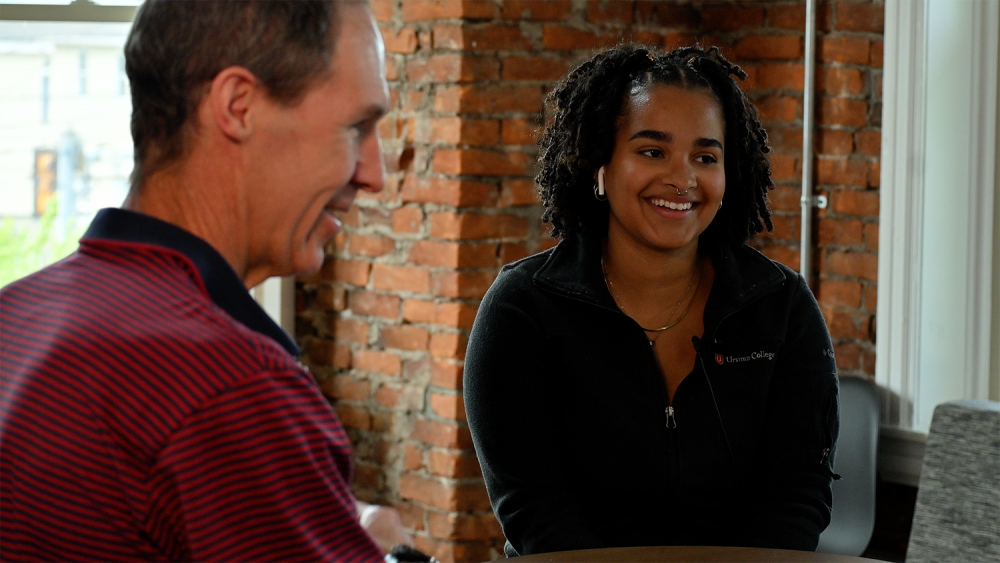
Other topics offer snapshots in time. In 1999, out of 39 projects, three focused on college students’ use of cigarettes, suggesting it was not simply just a project topic for students of Professor of Psychology Cathy Chambliss (who researched smoking cessation at the time), but also perhaps a point of contention on campus. (Indeed, the very next semester The Grizzly published an article titled, “Up in Smoke: Non-smokers Fed Up with UC Students Lighting Up.”) As time goes on, other topics play out like updated lyrics to Billy Joel’s We Didn’t Start the Fire: terrorism, social media, cyberbullying, the housing crisis, climate change, COVID-19.
The archives also show that the college was literally built for this sort of research. In the 2006 symposium program, Vice President for Academic Affairs and Dean of the College Judith Levy wrote:
“Ursinus College has a long tradition of fostering student-faculty collaborative research, an exceptionally effective pedagogy for undergraduate students. When Pfahler Hall was designed in the late 1920s, the architectural plans included research laboratories for each professor ‘in which he serves as an investigator and in which, under his direction, students are trained in the methods of research.’ The original Pfahler Hall design and its underlying pedagogy were very progressive for undergraduate science education of that period, and you can see in the renovated Pfahler Hall as well as in the new Kaleidoscope Performing Arts Center enhanced innovative architectural design that is even more effective in fostering student research and learning.”
That said, for some projects, the work has happened away from campus, at places such as at the University of Florida, the Pennsylvania Historical and Museum Commission, and the National Institute of Standards and Technology. For Rosie Cuomo ’22 and Rachel Conhoff ’22, their research on biological pest control—with Associate Professor of Biology Cory Straub—took them to Sweden, where they documented their experience on Instagram.
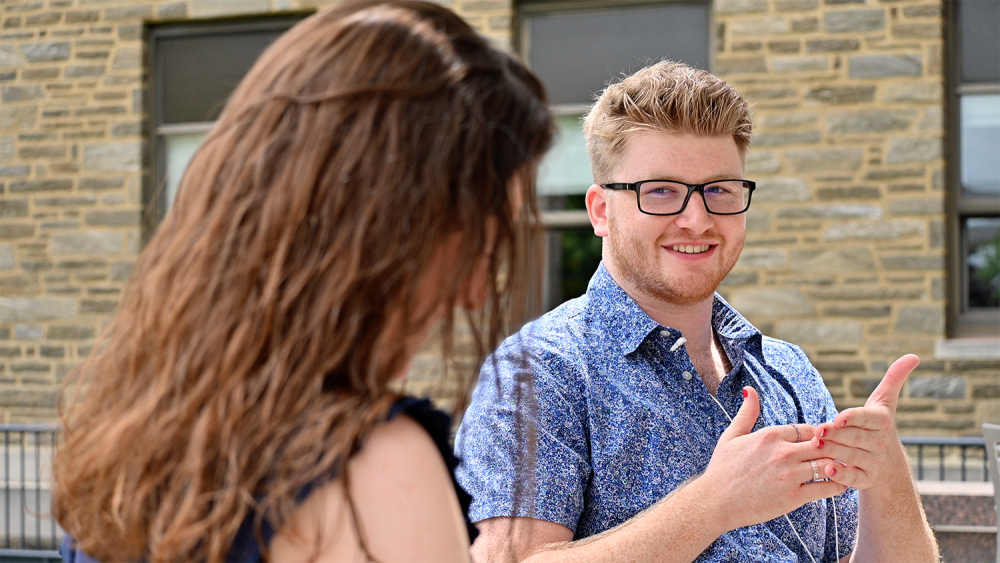
“By the end of the eight weeks, you feel like you’ve discovered something or written something that nobody else has before,” said Sorensen. “You move out of that college experience of dependence to independence. You move from acquiring knowledge that’s been assigned to you to creating it or discovering it on your own. There’s nothing like the self-confidence boost a student gets from that moment, when they feel like they’re a contributor to the broader human intellectual and scientific project. That’s really life-changing to be that kind of person—and it can happen at the undergraduate level.”
In addition to acquiring research methods, students are also taught to create work that is rigorous, relevant, and respected, often leading to honors projects, independent studies, conference presentations, publications, graduate school, and the workforce.
“What’s really great about Summer Fellows is how much it does to advance graduate school and employment opportunities for students,” said Sorensen. “If you imagine how a recommendation letter looks for students who have done Summer Fellows, there will be a line that says the student won a competitive summer fellowship to work on the topic of their choice. That’s cool. How many college students can say that? Not very many at all.”
It’s a trajectory that Tisha Brooks ’01 knows well. Working with Professor of English Patricia Schroeder ’74 and the late Rev. Charles Rice—both of whom recommended the program as a way to jumpstart her senior thesis project on the novels of Toni Morrison—she researched what had already been written about Black women’s history.
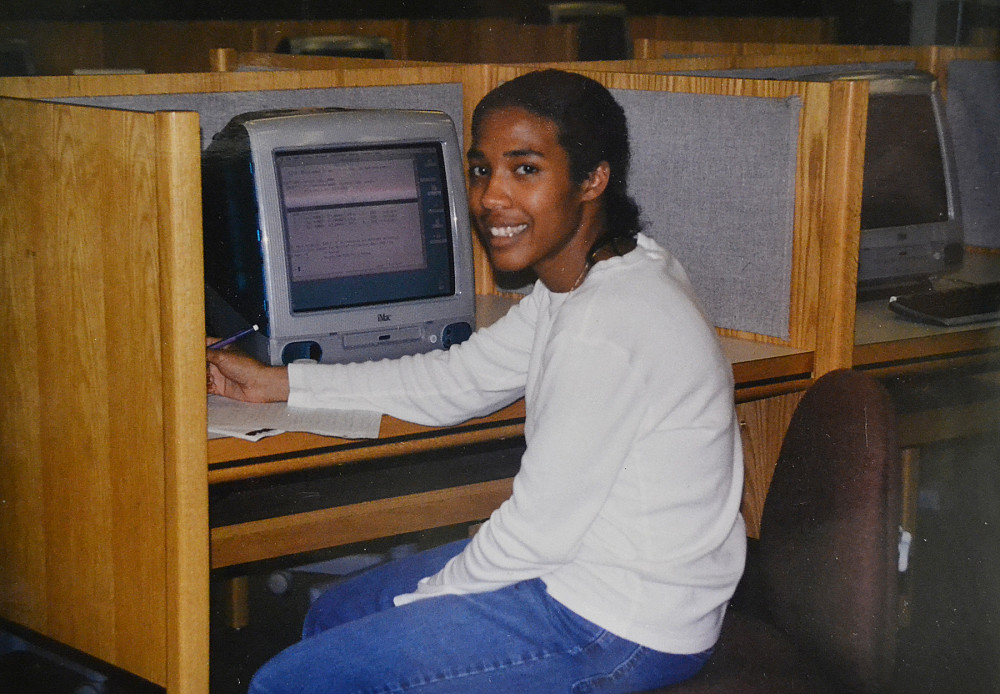
“My discovery was that there weren’t many publications that focused on Black women’s history, and the overwhelming majority of publications that focused on Black history privileged the experiences of Black men,” said Brooks. “I read every text on Black women’s history that I could find and through the process came to understand the importance of Morrison’s novels: Her work attempts to fill in the gaps in the historical record and tell the stories of Black women that others have been unable or unwilling to tell.”
“As a Summer Fellow, I learned how to do interdisciplinary research, how to pursue questions I didn’t know the answer to, and how to become a producer of knowledge, rather than just a consumer. In the process, I discovered what it means to be a scholar. That experience informed my decision to apply to graduate programs and ultimately to get a Ph.D. and become a faculty member at a university,” said Brooks, who is an associate professor of English and interim associate dean in the College of Arts and Sciences at Southern Illinois University Edwardsville.
“The kinds of questions that I asked as an undergraduate and my interest in unearthing new stories about Black women’s lives still inform my teaching and my scholarship now … I taught a Toni Morrison seminar as well as an African American Women Writers course regularly over the past nine years. Moreover, my forthcoming book, Spirit Deep: Recovering the Sacred in Black Women’s Travel, continues my commitment to interdisciplinary work that foregrounds the contributions and stories of Black women,” she said.
“The work I do now absolutely has its beginnings in the intensive study of Black women’s writing and history that I engaged in during my Summer Fellows experience, and I am thrilled to know that the program continues today. I strongly encourage students to take advantage of the Summer Fellows program, not only because it allows students to explore their academic interests more deeply, but also because of the professional development it provides and the opportunity to work closely with faculty mentors is transformative. One of my favorite parts about my Ursinus College experience is how much I learned from faculty outside the classroom, and the Summer Fellows Program was one of the ways I maximized my undergraduate education.”
Manal Shehabi ’03 is another former Summer Fellow whose work in the program continues to inform her career as an applied economist who does interdisciplinary research and policy advisory work on energy, economics, and sustainability. As an Ursinus sophomore, she not only realized that she enjoyed research, but also that she excelled at it.
Her project, “Combatting the Stereotype: Islam’s Compatibility with Democracy,” which was awarded the Eugene H. Miller Prize for Best Essay in a Subject in Political Science, led to honors research working with Associate Professor Politics Rebecca Evans and Professor of Business and Economics Andrew Economopoulos. It was then that she learned the value of interdisciplinary work.
“My honors research considered both economic and political development and both quantitative and qualitative methods,” said Shehabi. “The Summer Fellows experience and the honors project that followed made me want to continue doing research, but to also focus on applied work that can actually improve things in the real world.”
After graduation, she worked in business public policy and then in economic consulting. In both jobs she used skills obtained during her Summer Fellows research, but she also credits the experience for inspiring her to obtain a doctorate degree in economics.
“Like my Summer Fellows research project, in my Ph.D. I embarked on a research question despite objections from many, but continuing despite the noise enabled me to make important contributions to energy and economic sustainability challenges,” said Shehabi. “To demonstrate, when I started my Ph.D. research, some prominent experts said examining sustainability in oil-dependent economies in the Middle East was not an important question because these states had lots of money, but when the oil price collapsed in 2014, my research came to the forefront. So persistence and support of my research mentors paid off.”
Now located in Oxford, U.K., Shehabi is an academic visitor at St. Antony’s College at the University of Oxford, and founding director of SHEER Research & Advisory Ltd.
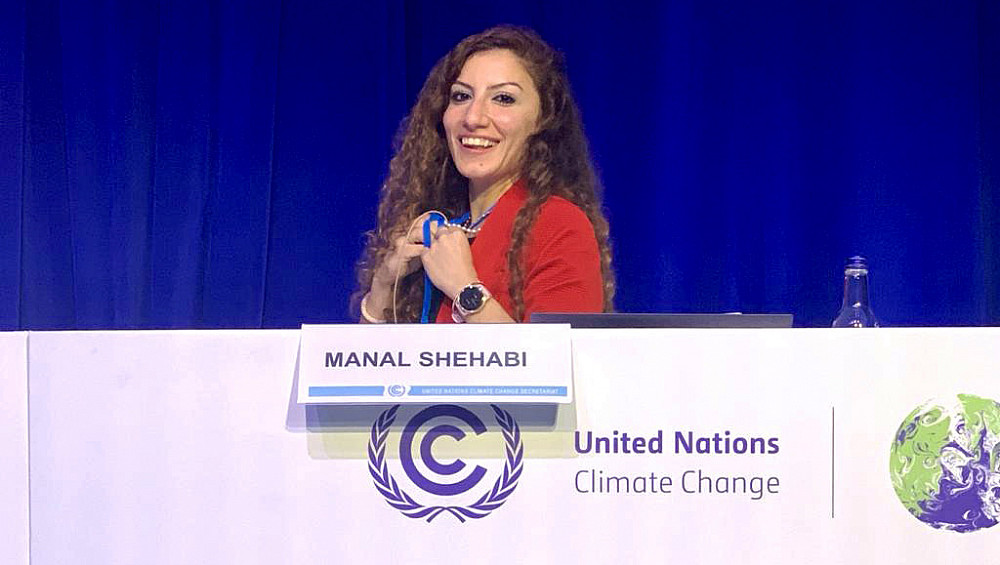
“The entrepreneurial aspects of undertaking independent research during the Summer Fellows program came in handy not only in my subsequent research, but also when I established my company last year to provide research and advisory work,” said Shehabi. “Like my Summer Fellows project, my current research focus is international with a focus on the Middle East and energy and resource-dependent economies. I present my work and research findings both in academic settings and beyond—in corporate settings, to international organizations, government officials, as well as local and international media outlets on TV, radio, and print.”
The combination of research, writing, and presentation skills “offered me professional and academic opportunities all over the world, and I would not be where I am today had I not done my Summer Fellows program.”
No doubt, the opportunities that the college provides for undergraduate research are among the hallmarks of an Ursinus College education. While the focus, as the name of the program indicates, is naturally on the fellows themselves, there are counterparts to the partnership who are equally as impressive: the faculty.
“When I talk to my fellow deans at other colleges like us, one thing they’re surprised about is how willing faculty are to work with students in the summer,” said Sorensen. “It’s rare to have so much faculty investment with students during the summer.”
Below, faculty share their passion for the program and offer a glimpse at what fuels their long-standing dedication.
Ellen Dawley, professor of biology
Mentor since: 1990 (Dawley mentored a biology researcher one summer two years before the HHMI grant was received.)
Students mentored: 50+
Many biology students want to experience what it’s like to do real scientific research. While many of my researchers go on to medical, veterinary, or dental school, they take away the ideas of how science is done, which can not only inform them as practicing clinicians, but can also inspire many to keep doing research even as clinicians. I think they all see research at Ursinus also as a way to be mentored by a faculty member, and we often become good friends. Students going on to graduate school must have the research experience as an undergraduate to be competitive. Paul Forlano ’94 went on to earn a master’s degree at Florida Institute of Technology, where he actually introduced the research techniques he learned with me to his adviser’s lab. He then earned a Ph.D. at Cornell University, and is now a professor at CUNY Brooklyn. I have been very involved in undergraduate research, and it is one of things about my job that I value most.

Anthony Lobo, associate professor of biology
Mentor since: 1997
Students mentored: 40+
My involvement with Summer Fellows over the years has been among the most satisfying aspects of my career at Ursinus. I’ve worked with so many awesome students that have gone on to do great things. Lou Altamura ’01, who got his Ph.D. at the University of Pennsylvania and is a virologist working on the frontlines in COVID-19 research at the Battelle National Biodefense Institute, worked with viruses as a Summer Fellow in my lab. John Sears ’99 got his start with viruses here, then earned a Ph.D. in virology at Northwestern University and is now at the pharmaceutical company CSL Behring.
In the classroom or teaching lab, it is always gratifying to see students learn, understand, and begin to enjoy. But to witness the kind of deep understanding and love a student gains when doing research on a question—it’s like they become a different person. That’s what moves me about student research, and Summer Fellows is a pure research experience.

Sheryl Goodman, associate professor and chair of media and communication studies
Mentor since: 1998
Students mentored: 20
The Summer Fellows program is a very special opportunity for students to work independently on a big project that they find interesting and to work one-on-one with a faculty mentor. I think it allows students to begin to see themselves as creators of knowledge, and it gives them confidence in that they can see their project develop and see that they are capable of more than they may have known.

Lew Riley, professor of physics
Mentor since: 2002
Students mentored: 31
I’ve done research with students at Ursinus for 20 summers. These students have been supported by the National Science Foundation and other external funders, but nearly all of them have participated in the Summer Fellows program.
The Summer Fellows Program is distinctive in that it supports scholarly and creative work in all disciplines at the college as opposed to the much more common focus on STEM fields (where external funding is more readily available) among undergraduate summer research programs. Our students benefit in many ways from the breadth of the program. There are opportunities for ‘cross pollination’ of ideas, making personal and intellectual connections, finding inspiration, and building community.

Mark Ellison, professor of chemistry
Mentor since: 2006
Students mentored: 42 (This number includes FUTURE students (Fellowships in the Ursinus Transition to an Undergraduate Research Experience program, which provides research opportunities to students traditionally underserved in the sciences and mathematics) because they work directly with Summer Fellows.)
The program helps students apply their classroom knowledge and skills to an unsolved problem. Students also develop important problem-solving and critical-thinking skills. They learn new techniques and gain confidence to be able to work independently. By dealing with the setbacks and frustrations that inevitably occur in research, students find an inner strength they never knew they had. Finally, by presenting their research at the end of the program, they build their communication skills. Summer Fellows really reflects Ursinus’s commitment to fully developing students’ potential and was a big reason why I came to Ursinus.

Tom Carroll, professor of physics
Mentor since: 2008
Students mentored: 32
There are really too many things to say here, but I often boil this down to two fundamental points for my research students. First, students are accustomed to solving problems in the classroom that have answers. They know that they can come to their professor for hints and guidance on how to get to the answer. Research is different; by definition no one knows the answer. Students must develop the confidence to attack truly unanswered questions and the creativity to try many approaches. Second, research is most often a long string of failures punctuated by rare successes. The sheer volume of failure required to have success is often a very new intellectual experience for students. Both of these obviously contribute to success in the classroom but, more importantly, our students become better prepared to handle challenges in the real world.

Ed Onaci, associate professor of history
Mentor since: 2015
Students mentored: 10
The Summer Fellows program helps students realize that they’re capable of extended research projects beyond what they’re used to doing in their classes. It builds their confidence and builds their sense of self in many ways. For some of them, it helps determine what they want to do after they’re done with college: Some have gone on to do research in various capacities, attended grad school, worked for nonprofits, etc., and for other people, the program has helped them develop skills that they’re able to take into whatever area of life they find themselves in once they’ve graduated.

Meghan Brodie ’00, associate professor and chair of theater (and former Summer Fellow)
Mentor since: 2017
Students mentored: 10
I love this question! As a student, I had the amazing opportunity to do two summer fellowships and as a faculty mentor, I have advised 10 Summer Fellows. Without reservation, I can say that Ursinus’s Summer Fellows program affords students unparalleled opportunities to pursue independent research and/or creative scholarship. For eight weeks or more, students are gaining hands-on experience in the disciplines to which they feel called. They are innovating, refining skill sets, and distinguishing themselves in ways that make them even more competitive candidates for graduate school positions and jobs post-graduation. As a former Summer Fellow, I am grateful for the guidance of my mentors who encouraged my intellectual and creative curiosity. As a mentor myself, I am excited by the work of my students; they inspire me to think outside of the box and challenge myself. In many ways, Ursinus’s Summer Fellows program is the embodiment of Ursinus Quest—each of the four questions shapes students’ work and guides students toward their own personal professional fulfillment.

